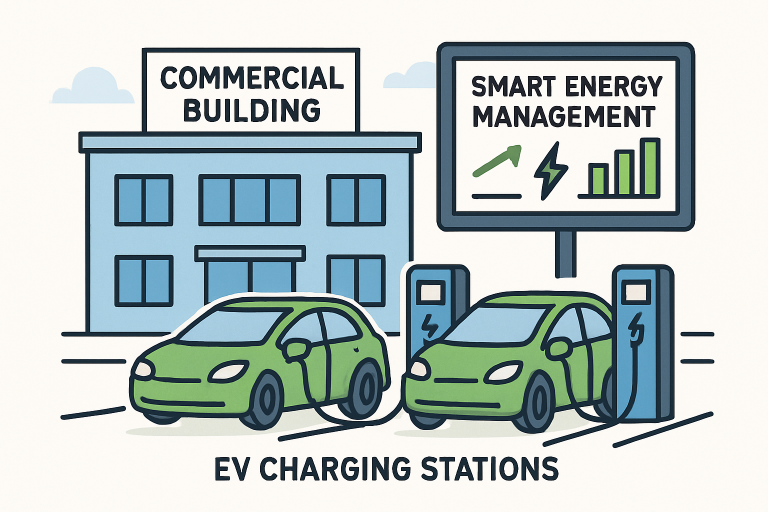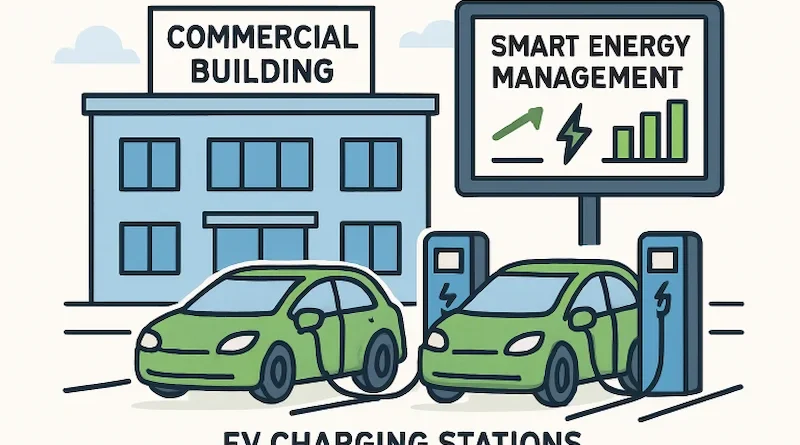The Role of Smart Charging Infrastructure in Modern Commercial Properties
The rapid rise in electric vehicle (EV) adoption is transforming commercial real estate. As electric vehicles become more mainstream among businesses and consumers alike, there is mounting pressure on property owners to provide facilities that meet these new transportation demands. Not only does investing in smart charging infrastructure help future-proof valuable assets, but it also aligns with broader market trends toward eco-conscious building practices and green amenities. By integrating advanced EV charging stations—such as Blink’s commercial charging—property owners can proactively support sustainability goals while simultaneously offering a feature that distinguishes their properties within highly competitive rental markets.
As sustainability and technological adoption accelerate, it’s clear that commercial properties lacking modern charging solutions risk being seen as outdated. Properties that remain stagnant on this front may struggle to attract discerning tenants who prioritize environmental stewardship and innovation. Smart charging infrastructure provides a visible, practical commitment to green living, and it delivers a concrete benefit for tenants and visitors, positioning a property as modern, convenient, and environmentally responsible. This forward-thinking approach can ultimately drive higher occupancy rates, retain existing renters, and enhance the brand reputation of a property or management company.
Enhancing Property Value and Tenant Appeal
EV charging stations are powerful differentiators in today’s market. Commercial properties equipped with EV chargers have experienced value increases of up to 15%. This appreciation is mainly due to these properties’ ability to attract new tenants and retain existing ones, particularly those with established or growing sustainability mandates. EV charger installations help fulfill ESG (environmental, social, and governance) obligations, making buildings more attractive to companies with sustainability-focused branding or reporting requirements. Incorporating smart charging infrastructure can help foster a progressive image that attracts high-quality, long-term tenants.
Furthermore, offering EV charging provides property owners with a key advantage when marketing building amenities to prospective tenants and during lease renewal discussions. Employees and visitors are increasingly seeking sites that support greener transportation options, especially in urban settings where demand for EVs is rising. Many organizations now champion carbon-reduction strategies and look for properties whose amenities align with their corporate responsibility goals and workforce expectations. A facility with modern, reliable EV chargers not only caters to individual drivers but can also serve as a recruiting tool for businesses seeking a competitive edge in talent markets concerned about sustainability.
Operational Efficiency and Cost Savings
Beyond bolstering property value, innovative charging systems dramatically enhance operational efficiency. These systems are designed to intelligently manage a building’s overall energy use, ensuring smooth, optimized power delivery even as demand fluctuates throughout the day. By balancing the electrical load and strategically distributing energy, smart chargers help minimize the risk of overloading existing infrastructure or incurring steep peak-demand penalties. Scheduled charging capabilities allow property owners to prioritize EV charging during off-peak utility hours, taking advantage of lower electricity rates and further reducing operational expenses over time.
Advanced analytics and remote monitoring provide enhanced control, allowing property managers to track energy consumption, optimize utilization, and proactively address potential issues before they disrupt service. Demand management features built into smart chargers can help managers identify patterns for optimal use and cost efficiency, while less sophisticated systems may inadvertently increase expenses. Smart charging can also help extend the lifespan of electrical systems by preventing frequent overloads and reducing the burden on backup or supplementary power sources.

Strategic Partnerships for Effective Deployment
Deploying an adequate EV charging infrastructure goes far beyond simply installing a few chargers in the parking lot. Successful implementation often requires coordinated collaboration among property owners, technology providers, utility companies, and, in some cases, local governments. Strategic partnerships enable property owners to select charging solutions ideally suited to their unique needs and existing facility management protocols.
For commercial property managers, working with expert partners provides critical insights during everything from initial site analysis to hardware selection, installation, and ongoing support. Partnering with reputable providers ensures access to evolving technologies, regular updates, and troubleshooting assistance, which is vital as the landscape of EV charging infrastructure continues to develop. This collaborative approach can also help property managers align their decisions with the best practices and regulatory frameworks governing commercial buildings and public utilities.
Case Studies: Successful Implementations
Several real-world examples provide compelling evidence of the measurable benefits of smart charging infrastructure. A leading business park in a metropolitan area reported a remarkable 20% increase in new leasing inquiries after introducing a suite of EV chargers, indicating the immediate impact such amenities can have on property desirability. Similarly, a high-rise office building documented a 15% uptick in lease renewals directly corresponding with the introduction of a comprehensive EV charging program, highlighting the growing importance of sustainable amenities in lease negotiations and long-term tenant retention.
The benefits of EV infrastructure extend beyond office buildings. Shopping centers, hotels, and multi-use complexes that adopted EV charging solutions have observed substantial increases in visitor dwell time. This extended stay translates to more shopping, dining, and spending throughout the property, delivering a valuable return on investment. These cases demonstrate that integrating smart charging delivers not only operational advantages but also clear economic incentives.
Best Practices for Implementing Smart Charging Infrastructure
To maximize the advantages of smart EV charging, property owners should adhere to several best practices:
- Assess Electrical Capacity: Conduct a thorough evaluation of existing electrical systems and anticipated demand to ensure adequate capacity and safe implementation. Consulting with electrical engineers or technology providers during this process is recommended.
- Prioritize Scalability: Choose interoperable, modular charging solutions that accommodate future growth as both tenant and public EV adoption escalates. Opting for scalable technologies allows incremental expansion while minimizing upfront investment risk.
- Form Strategic Partnerships: Work with reputable technology and service providers to guarantee seamless installation and ongoing management. Strategic partnerships help streamline the process, provide lasting support, and ensure compliance with regulatory requirements.
- Enhance User Experience: Implement intuitive access controls and streamlined payment options to make charging convenient for all users—whether tenants, employees, or guests. Simplifying the process improves adoption rates and user satisfaction, which contributes to the overall success of your investment.
Future Outlook: The Evolving Landscape of EV Charging
The EV charging environment in commercial real estate is advancing rapidly, with ongoing innovations making these systems increasingly valuable to property owners and tenants. New technologies such as contactless inductive charging, smart software-driven energy management, and vehicle-to-grid capabilities are reshaping what modern buildings can offer. Concepts like wireless, in-road charging, described by BBC Future, show how future infrastructure may allow vehicles to receive power automatically while moving, creating an even more convenient, plug-free charging experience. As these advancements progress, EV chargers are expected to operate not only as user-friendly amenities but also as intelligent energy tools that support the grid during peak times and work in harmony with building management systems. Property owners who choose to invest early will be better prepared to meet market expectations and remain competitive as technology and regulations continue to evolve. Implementing smart charging systems now builds a solid foundation for future growth, opening opportunities for additional revenue, such as paid charging services and participation in utility demand response programs, as the infrastructure becomes more advanced.
Conclusion
Smart charging infrastructure is fast becoming an essential part of modern commercial property strategy. Beyond offering a competitive edge and elevated property value, smart chargers deliver operational efficiency, aligning with sustainability trends and growing tenant expectations. With the right partnerships and adherence to best practices, commercial real estate owners can seamlessly transition and capitalize on this rapidly expanding market opportunity, ensuring both the short-term appeal and long-term resilience of their properties.
Visit the rest of the site for more interesting and useful articles.

